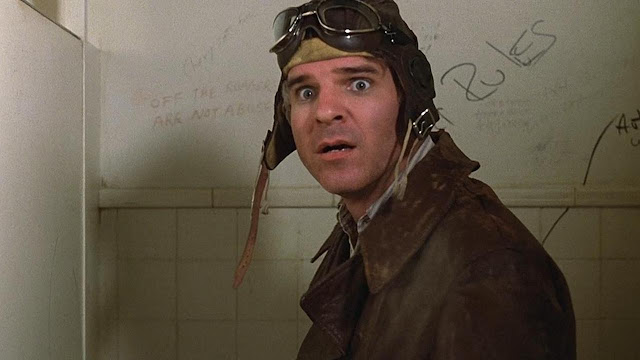The Jerk
You sometimes hear people remark of an older movie/television program/stand-up comedy routine: "They couldn't get away with that today!". Such examples might be BLAZING SADDLES, or The Jeffersons, or Eddie Murphy's show in the '80s. All of the above somewhat fearlessly attack societal mores on race relations, mores that are still very much in evidence in the twenty-first century. When 1979's THE JERK was released, the use of humor to comment on racism was sometimes dangerous, other times more innocuous. Use of the highly derogatory term "nigger" was certainly more prevalent, whatever the intention.
THE JERK, co-written by and starring Steve Martin in his film debut, takes a bid from Martin's stage act: "....I was born a poor black child." Navin Johnson was adopted by a family of African American sharecroppers, but despite his skin tone ("You mean I'm gonna stay this color?") and lack of rhythm is quite convinced he is one of them, through and through. When he finally leaves home, his naivete forms the basis for most the movie's gags. Seeing his name in a telephone directory gives him a sense of identity he's never known before. He learns from a rather scary female circus daredevil biker what his "special purpose" is for. But he also learns about true love after he meets a sweet woman named Marie (Bernadette Peters). Navin documents each adventure in a series of letters sent to his family back home in the South.
The film is also a rags to riches (to rags to riches) story, as Navin's eyeglass invention becomes wildly popular. Will success spoil Navin Johnson?
THE JERK, directed by Carl Reiner in the first a few collaborations with Martin, is expectedly crude and ribald. There are jokes about penises, testicles, excrement, rough sex, T-shirts on children that read "Bullshit", a dog named "Shithead", and cat juggling. The film is mostly good natured, but there are a few curiously dark moments. The film may be decried by contemporary viewers as a mere point and laugh against the mentally challenged, and perhaps more potently, against African Americans. At first glance, anyway. Is that accurate? Martin, who co-wrote the screenplay with Carl Gottlieb and Michael Elias, begin with a potentially offensive premise and, well, keep it there. But damn is it funny.
As time went on, Martin would reveal more of his erudition, his perhaps true comic nature. One that was more refined and pleased with quiet wit. You might have to look hard to find any in THE JERK or THE MAN WITH TWO BRAINS.
There could certainly be a social commentary within this movie, one in which the white man, always the dominant in society, has his privilege revoked. His stereotypical views of other cultures, women, and success are turned inside out at every turn. But does Navin have such perspective? Or is he the vessel through which Martin and company make their barbs?
When, SPOILER ALERT, Navin rejoins his family on the (newly expanded) front porch to sing Negro anthems, he has come full circle in his journey. He has been levelled socially with them, even as they have amassed their own fortune.
Or you could just enjoy this silly farce for what it is, an unapologetically broad collection of classic comedic moments. Navin's "that's all I need" speech is still widely quoted today.



Comments